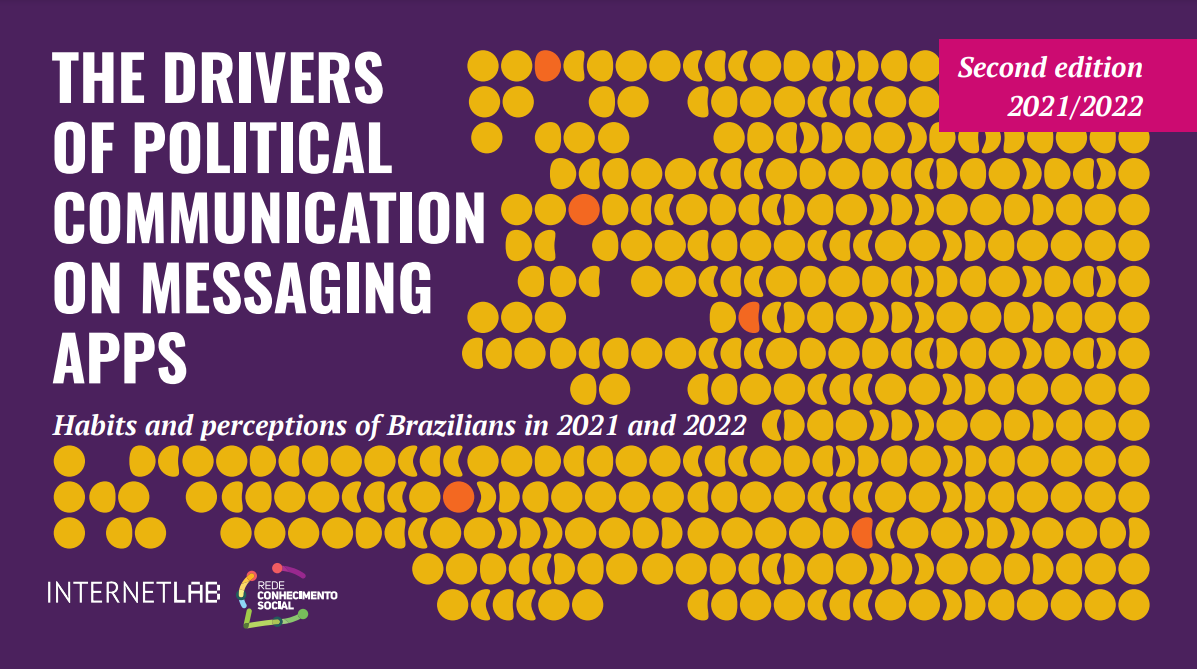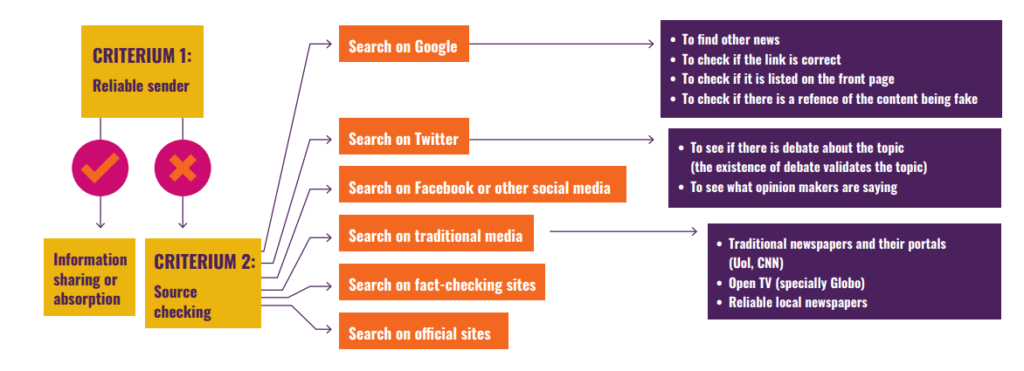
Consumption of information in messaging apps is made in relation to other media, new research points out
The second edition of a study on behaviors and perceptions of Brazilians in private messaging applications is released by InternetLab in partnership with Rede Conhecimento Social.
Since 2018, the prominence of messaging apps has been observed in discussions about how political communication takes place on the internet and how it should be regulated. This points to the need to build a deeper understanding of the relationship established between these tools and their users in the dynamics of private and public discourse.
The second edition of the research “The Drivers of Political Communication on Messaging Apps” revealed that, even though they have a specific position on the chain of access, consumption and distribution of information, messaging apps are only one of the factors in the dynamics of circulation and consumption of information. The relationship the message applications establish with other media (i.e. radio, TV, social media and search engines) is a crucial element for the definition of dynamics of circulation and consumption of information, mainly in constructing parameters of reliability of these contents by users and social groups.
The project, conducted by InternetLab in partnership with the Rede Conhecimento Social, sought to investigate the habits, behaviors, and perceptions of messaging application users; how they shape the dissemination of political and electoral content; and how they define the way they receive information in these channels.
The study – that used the same multimethod research as the first edition, with focus groups for qualitative data collection combined with a random survey, – brings quantitative and qualitative data about how users relate to political-electoral content and conversations in messaging apps. The research sought to map the habits and perceptions of Brazilians regarding political-electoral content, as well as sociodemographic characteristics, which contribute to the configuration of specific situations of political communication in these spaces. With a focus on the user’s perspective, the publication analyzes the different contexts of political communication and propaganda in private messaging apps, aiming to shed light on the user’s role in these dynamics.
Rules, norms and veracity criteria: the “new ethics” of WhatsApp groups
The survey identified the consolidation of a trend observed in 2020: to avoid conflicts and deal with a general feeling of wear and animosity, a “new ethics” for coexistence in WhatsApp groups is being consolidated, with rules created by administrators and implicit norms that govern how each user participates in these spaces. According to the study data, 58% of people say they are being more careful about what they say in the groups (it was 40% in 2020), while 64% avoid sharing messages that may attack other people’s values (57% in 2020) and 50% say they avoid talking about politics in the family group to avoid fights (40% in 2020).
But not only the fear of conflict and saturation motivates the structuring of this “new ethic” in the groups. The knowledge of terms such as “misinformation” and “fake news” is widespread among users, as well as an initial distrust of any information one receives. Of those interviewed, 44% consider that large WhatsApp groups where many people do not know each other have more rumors than small groups where people know each other. As a result, reinforcing a trend already identified in 2020, it is observed that users increasingly seek to interact only in smaller groups in the application with people they know and have affinities.
At the same time, users increasingly find themselves in an environment threatened by what they call “fake news,” where mistrust of any content grows, and various criteria for checking and passing on information are forged. In a process that involves factors such as individual values, affinity with beliefs, ideas and other users, and trust in peers, among others, people create their checking strategies, resorting to external sources to verify authenticity before sharing information, political messages, or even a link. This dynamic makes WhatsApp become an information distribution channel whose reliability is built on other platforms or relationships.

Each application has a function
According to the survey data, while 99.8% of internet users use the WhatsApp app, 43% are Telegram users, a 12 percentage point growth from 2020. The increase of the use of Telegram draws attention, as do the new roles it plays in Brazilians’ media consumption. While WhatsApp is part of everyday life and of maintaining ties, having functions as a telephone, payment intermediary, and virtual customer service, among others, Telegram is a tool more for accessing content than for communication, often used as a search tool.
Thus, if, on the one hand, people seek to interact in increasingly smaller groups on WhatsApp, the ways of using Telegram show a tendency to broaden horizons and strengthen communities, have access to new content and interact with people who share common interests that are outside your social circle This dynamic is reflected in the types of groups people use in each app. Family, friends, and work groups, the three largest on WhatsApp, have less relevance on Telegram, where groups linked to more particular topics and interests gain prominence: news, economy/business, issues of interest, and political/artist channels. Despite being called groups, many of these groups are channels within the application, where people are there to receive content and not necessarily interact.
2022 Elections
A little less than a year before the election, the survey also asked respondents about content regarding the 2022 election. According to the survey data (conducted in December 2021), two out of three respondents said that at that point, they had already received different types of messages about the 2022 presidential election. But, again, the receipt volume is not reflected in the sharing: 56% of people said they had not shared any content about the 2022 election.
As for participation in groups, 14% of WhatsApp users and 19% of Telegram users stated that they were already participating in political discussion groups about the 2022 elections. Although the numbers are not so different between the apps, the form of joining these groups is: in Telegram, an active posture is predominant, searching for groups or channels.
The data and analysis of the study can be checked at the second edition of the report “The Drivers of Political Communication on Messaging Apps”, coordinated by the Information and Politics area of InternetLab.
The document is available for download in english and portuguese.